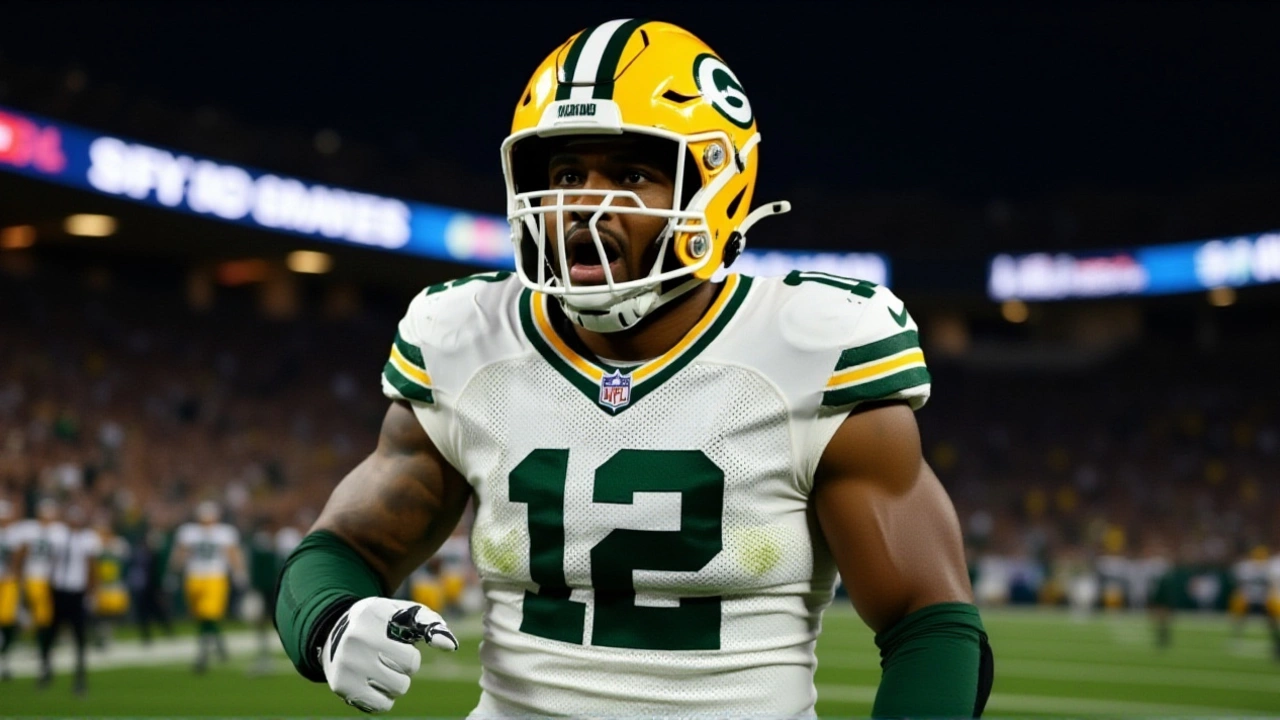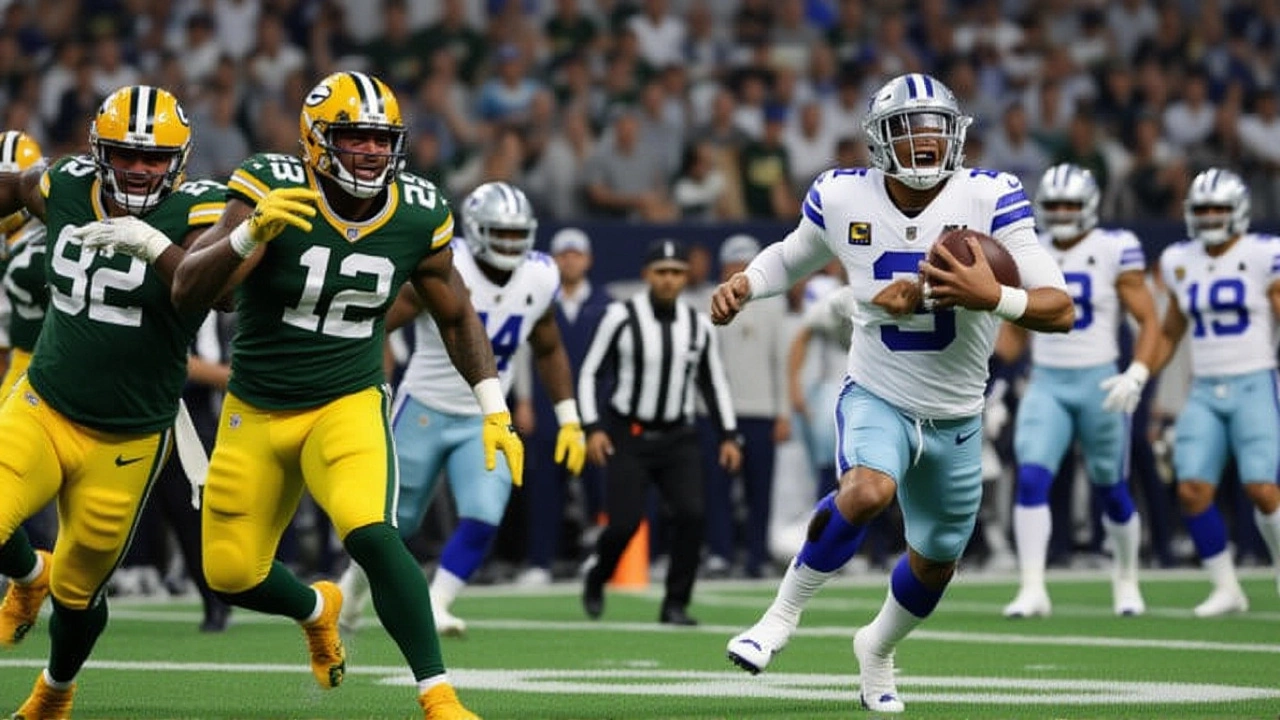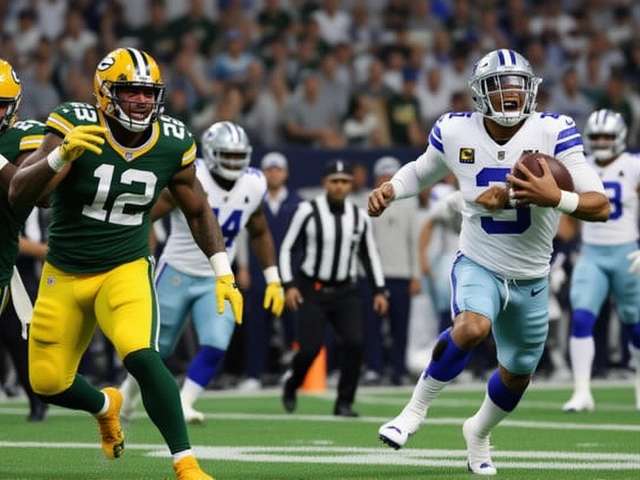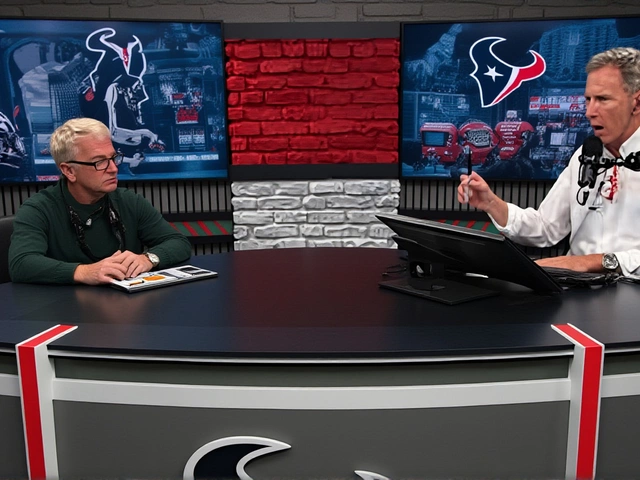When Dallas Cowboys hosted the Green Bay Packers at AT&T Stadium on September 28, 2025, no one expected a 40‑40 overtime tie to emerge from a game that looked like a shoot‑out from the opening kickoff. The Week 4 showdown, marked by 80 total points, multiple lead changes and a clutch 53‑yard field goal by McManus, left both clubs with a bizarre result that will be dissected for weeks.
How the Scoring Frenzy Unfolded
Both offenses lit up the scoreboard early. Dallas struck first with a 12‑yard touchdown pass to wide receiver CeeDee Lamb, but Green Bay answered on the next drive, as Jordan Love connected with Marquez Valdes for a 21‑yard score. By halftime the teams were dead‑locked at 21‑21, each having amassed over 350 yards of total offense.
The second half turned into a back‑and‑forth battle. Aaron Wilson bulldozed his way for two rushing touchdowns, while Cowboys running back Ezekiel Elliott added a 15‑yard plunge. Defensive lapses—four total turnovers, two from each side—kept the drives alive, and the clock kept ticking down as both coordinators went for it on fourth down in the red zone.With just 1:12 left in regulation, the Packers found themselves at their own 47‑yard line. Love orchestrated a methodical 12‑play march that pushed the ball to the Cowboys’ 38. The drive stalled, but McManus stepped up, nailing a 53‑yard field goal as time expired to force overtime. The stadium erupted, and the tie‑breaker was set.
Coaches' Take: Managing the Madness
“We knew we had to keep pushing,” said Cowboys head coach Mike McCarthy. “When you’re at 40‑40, it’s a mental battle as much as a physical one.” McCarthy praised his unit’s resilience but admitted the defensive breakdowns cost them a chance at a win.
Packers head coach Matt LaFleur, on the other hand, highlighted the importance of composure under pressure. “Jordan’s decision‑making in the final minutes was elite,” LaFleur remarked. “We trusted the right guys at the right time, and that’s why we got the ball back.”
Statistical Snapshot
- Total yards: Cowboys 426, Packers 416.
- Turnovers: 4 each (2 interceptions, 2 fumbles lost).
- Time of possession: Cowboys 31:45, Packers 28:12.
- Third‑down conversions: Cowboys 8‑12, Packers 9‑14.
- Red‑zone efficiency: Cowboys 5‑7 touchdowns, Packers 4‑6 touchdowns.
The numbers show a fairly even contest, but the three missed extra‑points by Dallas and two failed fourth‑down attempts by Green Bay kept the score from drifting further apart.
What the Tie Means for the NFC East and NFC North
The Cowboys slide to a 1‑2‑1 record, dropping to third place in the NFC East behind the New York Giants (2‑1) and Washington Commanders (2‑1‑0). The tie preserves a slim chance of a wild‑card berth, yet every game now feels like a must‑win.
Meanwhile, the Packers improve to 2‑1‑0, tightening the NFC North race. Their next opponent, the Minnesota Vikings, sits at 2‑1, so another win could vault Green Bay into the division lead.

Why Ties Have Become Rare, and This One Stands Out
Since the NFL introduced the current overtime format in 2012, ties have been a statistical rarity—only 29 in the past 13 seasons. Most overtime games now end in a winner because the sudden‑death rule (first score wins) heavily favors the team that receives the ball first.
What makes this tie different is the length of the extra period. After 10 minutes of overtime, neither team managed a decisive score, prompting officials to end the contest per league rules. It’s the first 40‑40 tie since the 2016 matchup between the New York Jets and Buffalo Bills.
Looking Ahead: Upcoming Challenges
Dallas returns to the field next Sunday against the Philadelphia Eagles, a repeat of a rivalry that often decides the NFC East’s fate. The Cowboys will need to tighten up their pass defense, which allowed 325 yards to the Packers’ aerial attack.
Green Bay heads to Lambeau Field for a home game against the Chicago Bears. Analysts predict a tighter defensive showcase, but the Packers’ offense, buoyed by Love’s poise, should remain a threat.
Historical Context: Ties in NFL Lore
Before the modern overtime era, ties were common—teams could finish a season with several. The 1979 Pittsburgh Steelers, for example, logged three ties en route to a Super Bowl run. However, the shift to guaranteeing a winner, with the addition of a 10‑minute overtime period in 2012, dramatically reduced the incidence.
Fans often debate whether the league should extend overtime or adopt a sudden‑death “next‑score‑wins” format for playoffs only. The 40‑40 stalemate reignites that conversation, as both pundits and fans argue that a definitive result would be more satisfying for a game that produced 80 points.
Frequently Asked Questions
How does this tie affect the Cowboys' playoff hopes?
The Cowboys stay at 1‑2‑1, dropping to third in the NFC East. They must win their next three games to stay in contention for a wild‑card spot, as the division leader now sits at 3‑0.
When was the last NFL game that ended in a tie?
The most recent tie before this clash was the September 8, 2023, 23‑23 deadlock between the New York Jets and Buffalo Bills, a game that also featured a high‑scoring shoot‑out.
What did Packers quarterback Jordan Love say about the comeback?
Love told reporters, “We stayed focused, took what the defense gave us, and trusted our guys. Getting that field goal was huge, but we still had work to do in overtime.”
Are ties likely to become more common under current NFL rules?
Experts say ties will remain rare because the league’s overtime period is limited to 10 minutes, and most teams can engineer a scoring play within that window. However, as offensive production rises, the odds of a dead‑lock inch upward.
What are the next big matchups for both teams?
Dallas faces the Philadelphia Eagles on October 6, 2025, a pivotal NFC East showdown. Green Bay hosts the Chicago Bears two weeks later, a rivalry game that could determine the NFC North leader.





